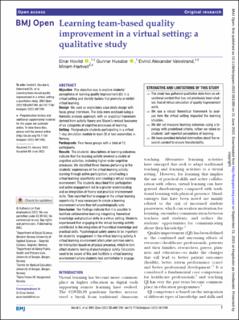| dc.contributor.author | Hovlid, Einar | |
| dc.contributor.author | Husabø, Gunnar | |
| dc.contributor.author | Valestrand, Eivind Alexander | |
| dc.contributor.author | Hartveit, Miriam | |
| dc.date.accessioned | 2022-09-22T10:55:59Z | |
| dc.date.available | 2022-09-22T10:55:59Z | |
| dc.date.created | 2022-09-20T10:38:34Z | |
| dc.date.issued | 2022 | |
| dc.identifier.issn | 2044-6055 | |
| dc.identifier.uri | https://hdl.handle.net/11250/3020654 | |
| dc.description.abstract | Objective
The objective was to explore students’ perceptions of learning quality improvement (QI) in a virtual setting and identify factors that promote or inhibit virtual learning.
Design
We used an exploratory case study design with focus group interviews. The data were analysed using a thematic analysis approach, with an analytical framework derived from activity theory and Bloom’s revised taxonomy of six categories of cognitive processes of learning.
Setting
Postgraduate students participating in a virtual 1-day simulation module to learn QI at two universities in Norway.
Participants
Four focus groups with a total of 12 participants.
Results
The students’ descriptions of learning outcomes indicate that the learning activity involved a variety of cognitive activities, including higher-order cognitive processes. We identified three themes pertaining to the students’ experiences of the virtual learning activity: learning through active participation, constructing a virtual learning opportunity and creating a virtual learning environment. The students described that participation and active engagement led to a greater understanding and an integration of theory and practical improvement skills. They reported that to engage in the virtual learning opportunity, it was necessary to create a learning environment where they felt psychologically safe.
Conclusion
Our findings indicate that it is possible to facilitate collaborative learning integrating theoretical knowledge and practical skills in a virtual setting. Students experienced that engaging in the virtual learning activity contributed to the integration of theoretical knowledge and practical skills. Psychological safety seems to be important for students’ engagement in the virtual learning activity. A virtual learning environment alters prior common norms for interaction based on physical presence, which in turn affect students feeling of psychological safety. Educators need to be aware of this and facilitate a virtual learning environment where students feel comfortable to engage. | en_US |
| dc.language.iso | eng | en_US |
| dc.publisher | BMJ Publishing Group | en_US |
| dc.rights | Navngivelse-Ikkekommersiell 4.0 Internasjonal | * |
| dc.rights.uri | http://creativecommons.org/licenses/by-nc/4.0/deed.no | * |
| dc.title | Learning team-based quality improvement in a virtual setting: a qualitative study | en_US |
| dc.type | Journal article | en_US |
| dc.type | Peer reviewed | en_US |
| dc.description.version | publishedVersion | en_US |
| dc.rights.holder | Copyright Author(s) (or their employer(s)) 2022 | en_US |
| dc.source.articlenumber | e061390 | en_US |
| cristin.ispublished | true | |
| cristin.fulltext | original | |
| cristin.qualitycode | 1 | |
| dc.identifier.doi | 10.1136/bmjopen-2022-061390 | |
| dc.identifier.cristin | 2053380 | |
| dc.source.journal | BMJ Open | en_US |
| dc.identifier.citation | BMJ Open. 2022, 12 (6), e061390. | en_US |
| dc.source.volume | 12 | en_US |
| dc.source.issue | 6 | en_US |

